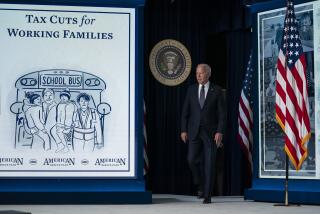Bush Proposes $2.3 Billion in Child Aid
- Share via
ROYAL OAK, Mich. — Texas Gov. George W. Bush on Tuesday proposed bigger tax credits for adoptive families and a $2.3-billion investment over five years in child welfare, pointing to his home state as the “leading edge” in securing safe and permanent homes for all children.
Speaking at a foster care center and surrounded by child care officials and the families they have helped, Bush stressed the importance of making sure foster care is a “temporary solution.” He said that, as president, he would streamline the adoption process, as he has in Texas, so children won’t languish in the system when they could be in safe and loving homes.
“The goal is . . . to reunite the children with the family, but if it’s impossible, foster care ought to be a bridge to adoption,” Bush told the rapt group crammed in a conference room at the 75-year-old, nonprofit Judson Center. “Adoption is one of the greatest acts of kindness in society.”
In Texas, Bush said he supported legislation that reduced final court reviews in adoptions from six months to four and allowed judges to terminate parental rights more swiftly in cases of abuse, neglect or abandonment. Such changes have helped boost the number of adoptions in the state by 175% since 1996, he said, and is “freeing up” more children for adoption than ever before.
The presumptive GOP presidential nominee said he would give states $1 billion to fund additional programs that would protect children who are at risk of abuse or neglect in their biological families. The goal is to head off the problems that send children in and out of foster care.
The funds, like those for his other proposals announced Tuesday, would come from the projected federal budget surplus.
An additional $300 million would be spread among the roughly 20,000 children who each year “age out” of foster care when they become old enough to leave the system.
Bush said the young adults would receive vouchers of up to $5,000 for college tuition or vocational training, so they can “get their feet on the ground and . . . understand that there is an America that belongs to them as well as everybody else.” About 20,000 children will age out this year, and Bush campaign officials said a similar number would be covered each year under the governor’s plan.
The governor also proposed increasing the adoption tax credit from $5,000 to $7,500, which would cost the federal government an additional $1 billion. Bush wants to make the onetime tax credit permanent to help parents cover nonreimbursable expenses associated with adopting a child.
Sierra Claire, who with her husband is in the process of adopting two young brothers who have been living in their foster home since 1998, told Bush she was unaware of such a tax credit. But, she added, it is “not really a big motivating factor” in their decision to adopt.
“Of course it isn’t,” Bush replied, draping his arm around the youngest boy, 9-year-old David, who grinned shyly at the crowd. “This is love. Love comes from the hearts and souls of people who’ve heard a call.”
The “strong families, safe children” initiative is the first in a string of social welfare proposals that Bush plans to present over the next three weeks, as he motors through a “compassionate conservatism” tour and presents himself as a different kind of Republican.
He chose to kick things off in a state that shows him running a close race with Democratic opponent Al Gore, whose aides have accused Bush of recasting proposals enacted by the Clinton administration and hiding “the same kind of Republican” behind a curtain of rhetoric.
“The American people will look beyond the rhetoric and see [Bush’s] shameful record of neglect,” said Vice President Gore’s spokeswoman Kym Spell, noting that Texas has more than 1.5 million children living in poverty and nearly all are uninsured. “The facts speak for themselves. Bush’s record in Texas is short on compassion and long on broken promises.”
Bush’s message was well-received by the Michigan audience, who praised his support for “forever families” and jockeyed for a chance to shake his hand, snapping photos with him as he worked his way outside. Conna Craig, director of the Boston-based Institute for Families, said what Bush is proposing will be a “huge leap towards making sure every child is loved and treasured.”
“Imagine growing up without anyone really knowing who you are or where you’re headed,” said Craig, herself a former foster child who was adopted when she was 8.
More to Read
Sign up for Essential California
The most important California stories and recommendations in your inbox every morning.
You may occasionally receive promotional content from the Los Angeles Times.










